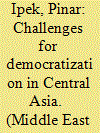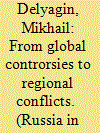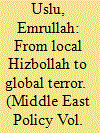|
|
|
Sort Order |
|
|
|
Items / Page
|
|
|
|
|
|
|
| Srl | Item |
| 1 |
ID:
077075


|
|
|
|
|
| Publication |
2007.
|
| Summary/Abstract |
The agenda of post-communist transformation seemed to have faded away in Central Asian countries until the tragic terrorist attacks of September 11, 2001. In the aftermath of the Iraq War, democratization in "failed" and authoritarian states has rapidly become the focus of U.S. foreign policy. Since the events in Kyrgyzstan, Central Asia has been added to the debate on third-wave democratization that has been witnessed in Georgia and Ukraine. In light of the increasing turbulence in Iraq and the unexpected death of Turkmenistan's President Niyazov, the challenges for democratization in Central Asia should be reevaluated. This article argues that the prospects for democracy in that region are vulnerable to internal and external actors as well as structural problems in the individual states, which possess vast energy resources and crucial routes for exporting them. Thus, to avoid the error of coddling dictators to serve its agenda, the United States should consider developing a longer-term policy that takes into consideration not only the strategic importance of Central Asia, but also the development of its civil society
|
|
|
|
|
|
|
|
|
|
|
|
|
|
|
|
| 2 |
ID:
060875


|
|
|
|
|
| Publication |
Jan-Mar 2005.
|
|
|
|
|
|
|
|
|
|
|
|
|
|
|
|
| 3 |
ID:
077078


|
|
|
|
|
| Publication |
2007.
|
| Summary/Abstract |
On November 20 and 25, 2003, Istanbul was rocked by four suicide bombing attacks in which trucks heavily loaded with explosives killed over 60 people. The November bombers first attacked two Jewish synagogues; five days later, the British Consulate General and the Istanbul headquarters of the HSBC bank were the targets. These dramatic, deadly assaults were unexpected and without precedent. They revealed that radical Islamic terrorist groups in Turkey pose a new and serious threat. Their goals and targets have become global rather than local, and their doctrine now sanctions the indiscriminate killing of innocent civilians. In support of their new modus operandi, their members are undergoing a thorough process of radicalization and training. As all of this suggests, these new terrorists generally share the aims, values and ideological orientation of al-Qaeda but are not directly subordinated to the organization.
Indeed, the group that carried out the bombings was typical of the many largely independent local al-Qaeda "franchises" identified in the Middle East today. Credible reports indicate that group leaders received some general funding from al-Qaeda sources. However, they recruited their subordinates, selected their targets, performed their operational planning, and acquired their vehicles and explosives on their own. They assembled their group on the basis of past organizational affiliations, kinship, tribal ties (to a limited extent) and, primarily, close personal and hometown relationships. Of course, these factors often overlapped. For example, several of the terrorists both had common roots in the radical Kurdish Hizbollah organization (see below) and were natives of the southeastern town of Bingol,1 traditionally a major center of radical right-wing Islamism in Turkey
|
|
|
|
|
|
|
|
|
|
|
|
|
|
|
|
| 4 |
ID:
077073


|
|
|
|
|
| Publication |
2007.
|
| Summary/Abstract |
For all the talk about ending the "oil addiction" and specifically dependence on Middle East oil, the world maintains a growing need for both. Since the topics of energy and the Middle East are so fraught with ideology and emotion, it helps even more than usual to start with a few facts. Some of these may be inconvenient, but they are true and they must be reckoned with.
The first is that the world's total annual energy consumption - oil, gas, coal, nuclear and renewables -Optimistically has increased from 104 billion barrels of oil equivalent in 1970 to 192 billion barrels of oil equivalent in 2000, and is projected to increase to 338 billion barrels by 2030. It is the flip side of more people, more development, and more consumption: it can be managed but it cannot be stopped
|
|
|
|
|
|
|
|
|
|
|
|
|
|
|
|
| 5 |
ID:
077077


|
|
|
|
|
| Publication |
2007.
|
| Summary/Abstract |
On October 3, 2005, Turkey's longstanding Kurdish problem potentially entered a new phase when the European Union formally initiated accession negotiations with Turkey. Although this process promises to be long and arduous, it also represents a watershed opportunity for the solution of Turkey's Kurdish problem. The Copenhagen Criteria required for EU membership mandate the stability of institutions guaranteeing democracy, the rule of law, human rights and protection of minority rights. There is no bargaining on these criteria. Turkey is required to accept them for entry into the EU. For all Turkish citizens (ethnic Turks and ethnic Kurds alike) who want to fulfill Mustafa Kemal Ataturk's ultimate goal of achieving contemporary civilization4, EU membership for Turkey would be a win/win situation because it would guarantee truly democratic Kurdish rights within the confines of Turkey's territorial integrity.
Turkey's EU candidacy would also help put the lie to the clash-of-civilizations thesis5 of inevitable war and even Armageddon between the Christian West and Islamic East. As a member of the EU, Turkey would offer the Muslim world an attractive moderate model of cooperation and prosperity with the West that would benefit all. In addition, young, hardworking Turkish immigrants will help solve Europe's population problem of a zero growth rate not being sufficient to support the EU's welfare states. Furthermore, Turkey's geostrategic access to the gas and oil supplies of the Middle East and Central Asia will make Turkey invaluable for the EU's future energy needs as well as providing alternative energy routes to Europe.
|
|
|
|
|
|
|
|
|
|
|
|
|
|
|
|
| 6 |
ID:
077074


|
|
|
|
|
| Publication |
2007.
|
| Summary/Abstract |
Turkey has historically been of great geopolitical importance to states in the regions surrounding it as well as to states more remotely located. As a member of NATO during the Cold War it was a geopolitical asset to the Western bloc as a strong ally in close proximity to the Soviet Union. With the fall of the Warsaw Pact, this consideration disappeared. However, Turkey has regained its geopolitical importance for other reasons. One of these is its location between large energy markets and major energy producers. Though it lacks its own significant mineral reserves,1 it has strategic advantages for energy transit as it lies between the Middle East, Russia and the Caucasus and the large energy markets of Europe and the West.
Many believe that having control over energy-transport corridors could be almost as essential as having control over energy supplies themselves.2 With its geostrategic position between important energy suppliers and consumers, Turkey can create a powerful role for itself in the global energy market. Turkey and other global actors have been working towards strengthening the country's role as an energy hub, aggregator and transit corridor in its region.3 The Baku-Tbilisi-Ceyhan (BTC) pipeline carrying oil from the Caspian to the Mediterranean opened in July 2006,4 and many other projects, including the Nabucco pipeline, which would supply Caspian gas to the EU, bypassing Russia,5 are under serious consideration. Through such initiatives, Turkey can not only gain energy security for itself, but also contribute to global energy security
|
|
|
|
|
|
|
|
|
|
|
|
|
|
|
|
| 7 |
ID:
077076


|
|
|
|
|
| Publication |
2007.
|
| Summary/Abstract |
On July 7, 2005, Uzbekistan's Ministry of Foreign Affairs accused the United States of failing to honor its financial obligations towards Uzbekistan. This was a transparent excuse. The United States had no financial obligations towards Uzbekistan. The Uzbek communiqué was the precursor to a formal eviction notice. Tashkent gave U.S. forces 180 days to leave the Karshi-Khanabad Air Base. This brought an end to a strategic partnership that was forged in the aftermath of September 11, 2001. Tashkent's move surprised many observers at the time, but with the benefit of hindsight it is reasonable to argue that the writing had already been on the wall for months. This paper examines the dynamics of U.S.-Uzbek relations and the single most important factor that broke the alliance.
A critical factor in policy making in post-Soviet Central Asia is the confluence of "national interests" with "regime interests." This is, of course, not unique; as a general rule, authoritarian regimes exhibit a pronounced tendency to project their own interests onto the nation. "National interests," in effect, become a euphemism for what is in the best interest of the ruling regime. This confusion is exaggerated in Central Asia. For example, in Turkmenistan, the late president named cities after himself or his mother and even renamed the months of the year after his mother. This is an extreme case. But other leaders are not far behind. In Uzbekistan, the ruling regime has systematically presented President Islam Karimov as the savior of the nation, a reincarnation of the fourteenth century hero and champion of Uzbek traditions, Amir Timur. In this paradigm, President Karimov and his government have an exclusive monopoly on defining what is in the best interests of the nation. Regime continuity, therefore, is seen by those in power as synonymous with national security.
|
|
|
|
|
|
|
|
|
|
|
|
|
|
|
|
|
|
|
|
|